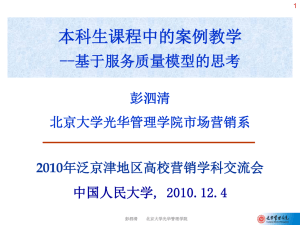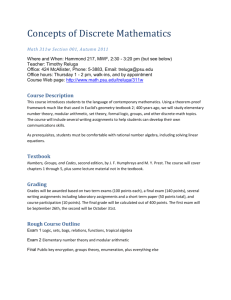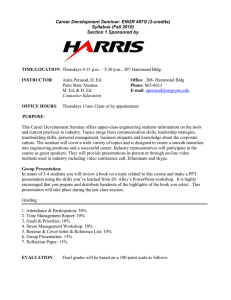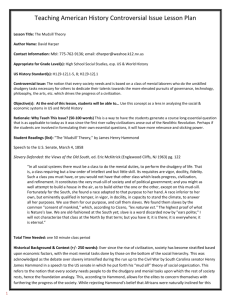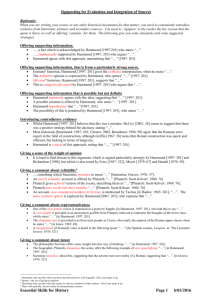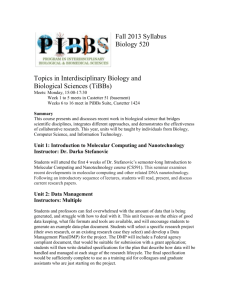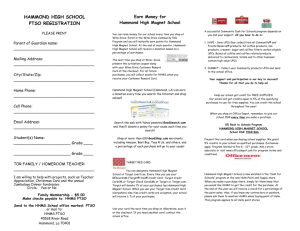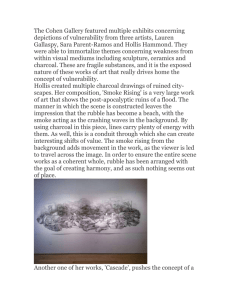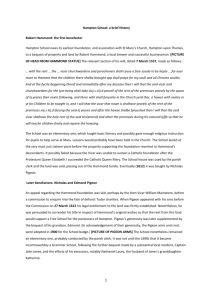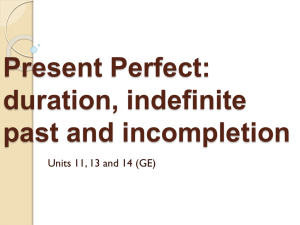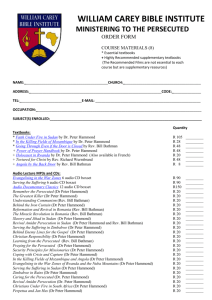syllabus - College of Engineering
advertisement
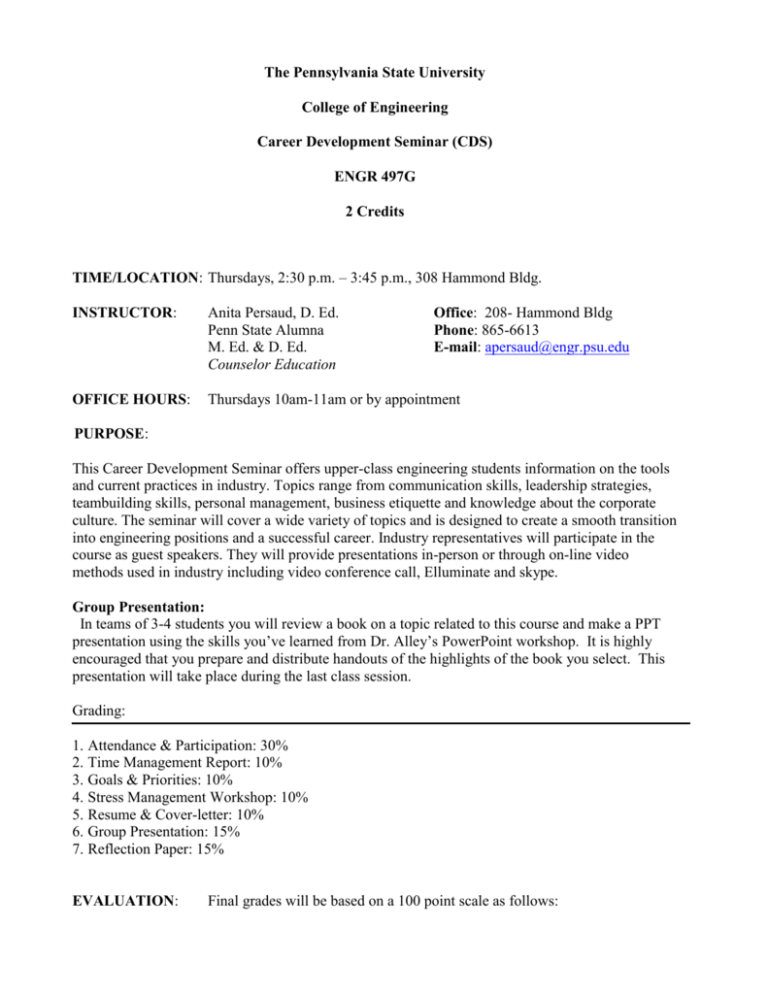
The Pennsylvania State University College of Engineering Career Development Seminar (CDS) ENGR 497G 2 Credits TIME/LOCATION: Thursdays, 2:30 p.m. – 3:45 p.m., 308 Hammond Bldg. INSTRUCTOR: Anita Persaud, D. Ed. Penn State Alumna M. Ed. & D. Ed. Counselor Education Office: 208- Hammond Bldg Phone: 865-6613 E-mail: apersaud@engr.psu.edu OFFICE HOURS: Thursdays 10am-11am or by appointment PURPOSE: This Career Development Seminar offers upper-class engineering students information on the tools and current practices in industry. Topics range from communication skills, leadership strategies, teambuilding skills, personal management, business etiquette and knowledge about the corporate culture. The seminar will cover a wide variety of topics and is designed to create a smooth transition into engineering positions and a successful career. Industry representatives will participate in the course as guest speakers. They will provide presentations in-person or through on-line video methods used in industry including video conference call, Elluminate and skype. Group Presentation: In teams of 3-4 students you will review a book on a topic related to this course and make a PPT presentation using the skills you’ve learned from Dr. Alley’s PowerPoint workshop. It is highly encouraged that you prepare and distribute handouts of the highlights of the book you select. This presentation will take place during the last class session. Grading: 1. Attendance & Participation: 30% 2. Time Management Report: 10% 3. Goals & Priorities: 10% 4. Stress Management Workshop: 10% 5. Resume & Cover-letter: 10% 6. Group Presentation: 15% 7. Reflection Paper: 15% EVALUATION: Final grades will be based on a 100 point scale as follows: Your final letter grade will be assigned from this final average according to the University guidelines: A >95 B 83-86 C 70-74 A90-94 B80-82 D 60-69 B+ 87-89 C+ 75-79 F <60 ATTENDANCE: Class attendance is important for succeeding in engineering. It is highly recommended that you exchange contact information with at least two classmates in the case of unexpected missed class sessions due to illness or family related emergencies. The Penn State Principles: 1. 2. 3. 4. I will respect the dignity of all individuals within the Penn State community; I will practice academic integrity; I will demonstrate social and personal responsibility; I will be responsible for my own academic progress and agree to comply with all University policies. Related sites: Penn State Principles, http://www.psu.edu/ur/2001/principles.html Code of Conduct, http://www.sa.psu.edu/ja/conduct.shtml Academic integrity, http://www.psu.edu/ufs/policies/47-00.html#49-20 SCHEDULE OF CLASSES The class meetings will include speakers, activities, programs, films and discussion. To ensure effective discussion, I encourage you to please have at least two questions for each presenter and share your thoughts during class discussions. Everyone has something valuable to contribute to this course. Topics are subject to change based on the presenters’ schedule and availability. Lesson Date 1 1/14 Topic Course Introduction Time Management MBTI Dr. Anita Persaud 2 1/21 Business Etiquette Telephone Cell Phone Email Dr. Anita Todd Location Homework Due to Class session Hammond 308 Hammond 305 Time Management report due Lesson Date Topic Location Homework Due to Class session Associate Professor, Professional Practice The Division of Professional Practice University of Cincinnati *3 1/25 6pm8pm Dining Etiquette Workshop Days Inn Hotel This is a 2-hour presentation with a 4course meal 3 1/28 Gender Communications and Success Strategies in the Workplace Hammond 308 Stress Management Assignment due 2/1 Andrea Esqueda, Accenture 4 2/4 Stress Management, Dr. Mary Ellen Litzinger 5 6 2/11 2/18 Dealing w/Difficult Communications Hammond 308 David Esqueda Hammond 308 Six Sigma – What is it and how is it implemented in industry Hammond 308 Jesse Shearin, PPG 7 2/25 Project Management and Team Skills How to motivate and re-energize teams How to work on a team as a junior member Hammond 308 Goals & Priorities due Hammond 308 Topic, Outline & Team Members for Final Presentation due How to plan, prepare and facilitate meetings Jayme Fullerton, Estee Lauder 8 3/4 First Day on the Job: Success from the Start Shannon Pelissero – PPG 9 3/11 Spring Break Hammond 308 10 3/18 Making Engaging PPT Presentations, Dr. Michael Alley Hammond 308 Performance Assessment & Career Hammond 11 3/25 Lesson Date Topic Options Location Homework Due to Class session 308 Kerry Wright and Kate Sampson Siemens 12 4/1 Negotiating the Hiring Package Professional Development Salary Vacation/Sick Time, 9/80 Promotion opportunities 401K/IRA Roth vs. Normal Relocation and business travel reimbursement Hammond 308 Danelle Wilson, Vice President of Manufacturing RR Donnelley *13 4/8 Resume & Cover-letter Updates When to ask your questions at interviews What to ask/Who to ask Do’s and Don’ts Bob Raybits & Tamara Valinoto, Northrop Grumman Electronics Systems 14 4/15 Self-Promotion Patricia Woody, Dept. Head Hammond 308 Resume & Coverletter & References Naval Surface Warfare Center 16 4/22 Why Do I Want to Hire You Dr. Bob Gochnour, BP America Hammond 308 This presentation deals with the different styles of interviews that students may encounter and the "soft skills" measure that recruiters commonly employ to select students. 17 4/30 Group Presentations Reflection Papers Due SRTE –Faculty Evaluations * The purpose of the Etiquette dining session is to teach students the unwritten rules of proper dining manners. The goal in having this session is to prepare students for interviews, meetings and other business engagements that require eating while working. Many corporations will invite students for interviews over a meal (breakfast/lunch/dinner) and it is critical that students are prepared and knowledgeable about the proper table manners to appropriate conversation topics to correct business attire. This is a time when students may be critically scrutinized for their lack of knowledge and the fact that the meal is not the focus of the session, the interaction with the corporate representatives is what is important. Topics to be covered during this session include: (knowledge about which utensil is appropriate from salad fork to meal fork to dessert fork, how to fold and place the napkin, how to pass the salt/butter/bread-basket etc., when to begin eating/drinking, what should they order/eat, how to eat and answer questions at the same time, how should soup be consumed, tactics for slow and fast eaters, how to indicate when are done with a course, how to greet and say good-bye to their host, etc.). This is a very valuable skill to acquire before graduation. This presentation is provided at very few student venues. That is why it is essential that this component of the Career Development Seminar is maintained.
